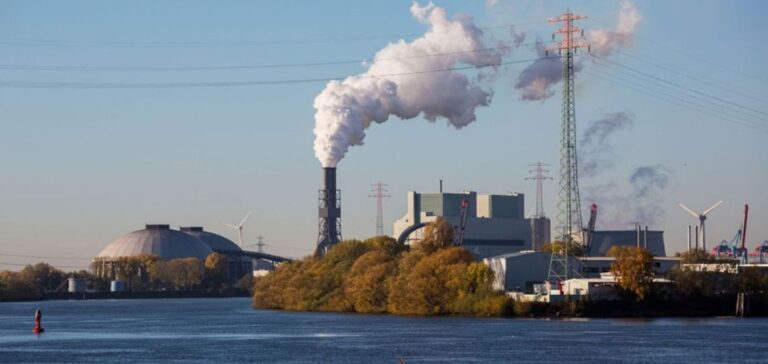At the age of 58, Thomas Kadowsky imagined himself working until retirement in his Hamburg synthetic resin factory, where he has held the same position of team leader for over thirty years. But his plans collapsed in March when he learned that the owner, German group Allnex, was to close the 90-year-old site, nestled among red-brick dwellings.
Iconic Hamburg plant closes, leaving workers in despair
“I was completely stunned,” he tells AFP. Like him, 130 employees will lose their jobs next year as a result of this closure, which Allnex justifies by citing “recent developments in energy prices”, which are crippling the chemical industry in Germany, once the lungs of the national economy.
Yet another example of the crisis facing this key sector of the national economy. Once an economic powerhouse, the chemical industry is now a burden on Europe’s leading economy. At the start of the year, the economy slid into recession. Second-quarter GDP figures will be released on Friday. “The house is on fire”, said Markus Steilemann, President of the VCI, the chemical industry lobby representing 1,900 companies.
Decline of the German chemical industry: a sector in difficulty
The chemical industry is of major importance in Germany. It employs 466,000 people and its sales represent 5% of GDP. It also plays a crucial role in supplying other sectors with intermediate goods. But for several months now, bad performances have been piling up. Sales fell by 11.5% in the first half of the year, and a 14% drop is expected for 2023. SMEs – 92% of the sector – are downsizing. In May, the number of employees in the sector fell by 0.8% year-on-year. Significantly, in February the giant BASF announced the loss of 3,300 jobs, with the closure of units at its historic Ludwigshafen site.
The consequences of cutting off supplies of cheap gas and foreign subsidies
For years, Germany has been boosted by cheap gas from Russia. Now, in the wake of the war in Ukraine, the sector is suffering because these supplies have been cut off. In addition, the last nuclear power plants in Germany have been shut down. Although prices have fallen since peaking in August 2022, according to the VCI, they remain very high: “five times higher” than in the USA and “between two and three times higher” than in China. Added to this are the generous subsidies granted to the sector by Germany’s competitors, led by the USA. Investment in the country fell by 24% last year, and a quarter of German companies are considering relocating part of their production, according to the VCI.
Debates on the future of the German chemical industry: between protection and restructuring
In Hamburg, the red flags of the IGBCE trade union fly in front of the Allnex site:
“This decision is illogical, as the plant is profitable,” says Christian Wolf, chairman of the works council. Management points to its “competitive position in Europe”. However, trade unions and businesses are in agreement in calling for a massive energy tariff shield, until prices come down with the planned deployment of renewables in the country. “We need a bridge to the future,” summed up VCI’s Steilemann.
In May, Green Economics Minister Robert Habeck proposed a cap of “6 cents per kilowatt-hour” on electricity until 2030 for the most energy-intensive industries. But his finance counterpart, the liberal Christian Lindner, is having none of it. Some experts are calling for the sector to be allowed to decline in Germany, so that we can concentrate on less energy-intensive sectors of the future.
“The priority objective of both industry and trade unions is (…) not to change and innovate,” lamented Moritz Schularick, President of the Kiel Institute of Economics, in an opinion piece. But without chemicals, the economy would lose a “highly productive sector, which for years has been the driving force behind industry as a whole”, warns Timo Wollmerhauser of the IFO institute. Especially as these are well-paid, socially beneficial jobs. “I’ll find another job. But never like here, paid so well and with such good conditions,” laments Torben Boldt, 26, a mechanic at the Hamburg plant.






















